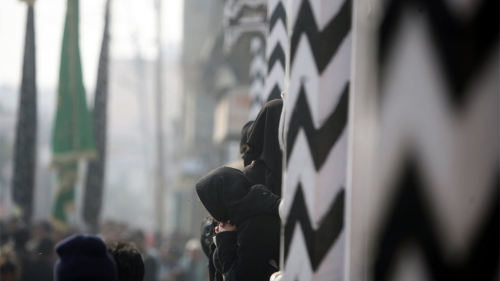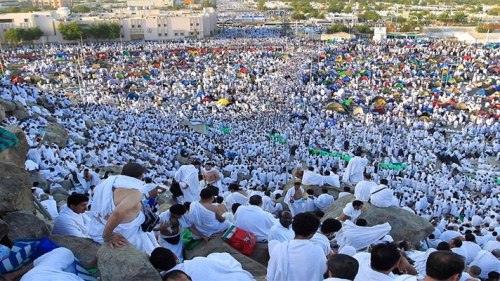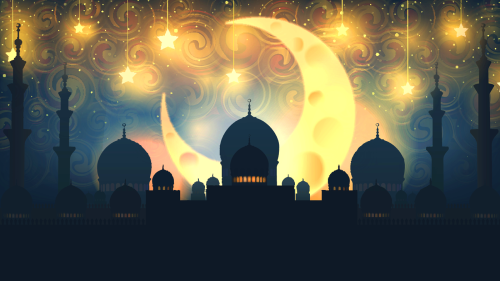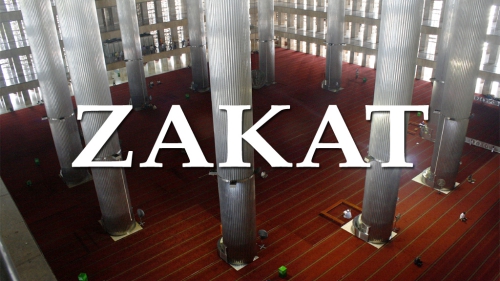Ramadan and fastidious fasts

Some potpourri observations..
I was Google-ing (i.e., surfing through the net), which is more than pastimes these days. Just to satisfy my curiosity, I entered the word "Ramadan" in the search box. There were 355,000 entries! I browsed through the first few pages or top entries. The fast search produced so much information about Ramadan and fasting. There were all those rules, pages after pages, presented so neatly and fastidiously [reflecting a meticulous, sensitive, or demanding attitude]. I am not sure if I myself know or can enumerate all those rules. All these rules might give the impression that after all Allah is the ultimate RULEr and therefore rules are all that matters. The more we have - to its minutest details - is better. Sometimes I tremble at the thought, whether persons such as myself, who might not be as fastidious, have any hope. If I consider all those rules, then my hope shrinks rapidly. On the other hand, when I read a Prophetic narration - "God is kind and he loves kindness in everything" [Sunan Ibn Majah, No. 3684] - I feel reassured.
I: No sweat, non-Muslims!
As my google-ing continues, I come across a typical aspect of these books or compilations of rules. I can't but chuckle. One of the subheadings: For whom the fasting is mandatory? Among the people for whom it is not mandatory are non-Muslims. It is mentioned that even if they fast, it won't be accepted by Allah. As if, non-Muslims are standing on one leg to fast, especially the fasting during the Ramadan! Of course, non-Muslims might feel relieved that they have been spared by our generous rule-compilers.
II: In sanity
Another group of people on whom fasting is not mandatory are those who are suffering from insanity. Unless we have a concern that as a society we might coerce people in fasting, and therefore certain group of people must be duly spared, then it is a different matter, even though "Let there be no compulsion in Deen" [Quran 2:256] is one of the fundamentals of Islam. Otherwise, is there anything that is mandatory on people suffering from insanity? One such compilation, and most such compilations are not much different, continues: "...the fast of the insane person ...is not valid because he cannot comprehend the worship, and he cannot meaningfully declare intention (niyyah), without which the acts are invalid." We must remember that those who have deduced all these details and those who enumerate these have done their work, while they are in sanity. However, one might wonder if an insane person fasts, would Allah reject his fasting? An insane person may not comprehend the worship, but if he still wants to offer, who has put us on the seat of judgment to say that his fast is invalid? So, are we saying that we should actually discourage such people from fasting, even if they want to? Or, should we inform and educate them that their fasting is invalid? Such information and ruling might jolt them to sanity!
The other ludicrous aspect of pronouncing the fasting of such people as invalid is to say that such a person "cannot meaningfully declare intention (niyyah)". Intention is a matter of mind, it does not need to be verbalized. Indeed, do the vast majority of Muslims, who do not know Arabic but verbalize (declare) intention in Arabic, know what they are verbalizing? I can't help but wonder that there might be a sense of competition among the compilers and enumerators of all these rules as to who can come up with the longest compilation. Furthermore, while reading these compilations of rules, one might have a good sense as to why and how our jurisprudence has gradually lost touch with the reality.
III: One Crescent, many accents
Most Muslim-majority countries don't have this problem, but the largest diverse Muslim group, in North America, every year goes through the crescent-sighting debacle. Let alone the Muslims of the United States, or just one state (such as New York), even one city (such as New York City) can't have the month of Ramadan begin or end the same day. Some want to follow sighting of the crescent in their own neighborhood. For some, any sighting in North America is acceptable. For some, crescent sighting anywhere is in the world is fine. Some would follow their native country. Some would follow Saudi Arabia. Others would like to go by ISNA. And, then there are others who would like to go by predetermined calendar. One Ummah, one crescent, yet so many accents of schism.
There are Muslims in North America, who would like to see an official holiday on Eid. Good luck! It's not going to happen until Muslims can set their priority straight. Until Muslims here (a) treat as a priority the unity of the Muslims in beginning and ending the Ramadan and (b) value that an official holiday for Eid is important at least for our younger generation, it is not going to happen. If we are to be united on this, we have to walk away from our parochial loyalty to groups, organizations, countries, etc. Rather, we need to be problem-solving oriented, within the "spirit" of Islam. But also, if we are to secure an official holiday in this country for Eids, for all practical purpose, we have to go by pre-calculated calendar. It would be unreasonable to expect the employers and schools to accommodate the uncertain dates. They are not going to be that amenable to such holiday, when we tell them we don't really know which day we are going to take off. Of course, if getting united and securing a holiday are not important as priority, we can continue free-style as we are doing now - going our own ways. Does problem-solving approach mean anything to Muslims?
IV: The Charity Culture
To be charitable is one of the noble dimensions of human beings. As Muslims, it should be our second nature. The Prophet was an utmost charitable person and his generosity would bare itself further during the month of Ramadan. In many Muslim-majority countries, mostly poor, there are Muslims who try to offer meal to the hungry and pittance to the beggars for asking.
But our charity culture is a dysfunctional one. While many of us are interested in giving a beggar a meal or some pennies, somehow our consciousness has not transcended to the level, where we take up the challenge to fight against poverty and destitution. The artificially created and defended dualism of poverty (as in many Muslim-majority countries of Africa and South Asia) and affluence (as in the oil-rich Gulf countries) exposes the stark contrast of our otherwise rich mosaic of the Muslim world. The dualism is not merely at the international level. The same is true inside Muslim-majority countries as well, where a rather small enclave of rich is surrounded by the ocean of poverty.
Our fasting culture that is supposed to instill in us Taqwa (God-conscious) seems to be divorced from the consciousness and commitment to transform our collective life out of the widespread misery. It is useless to talk about the "best of the people created for mankind" [Quran 3:110], where such people can't take care of themselves. With our fastidious fasting, our spirit soars high on the fast highway to heaven, attempting to leave behind the reality of inhuman misery and suffering of the vast majority of people who do not have food on their plates, clothes on their body, roof over their heads and medicine for their health. Is our other-world-bound spirit supposed to be removed from the reality of this world and our desire and commitment to overcome the problems here on this earth? Did the Quran ask us to think only about the other world, forgetting this one? Is it not from the Quran: "...seek, with the (wealth) which God has bestowed on you, the Home of the Hereafter, nor forget your portion in this world; ..." [Quran 28:77] Is our portion only in the problems in this world, not in the solutions?
V: Ramadan of the rich and the poor
A sad part of our Muslim world is that Islam is grossly marginalized in our lives. There is a dominant, secularized section of the society that is constantly pushing for further marginalization of Islam, while some among the Islam-loving segment, in their frustration and powerlessness, are reacting in rage. Unfortunately, many among those who seem to consider themselves Islam-loving are not always a big help either.
In many Muslim-majority countries, such as Pakistan and Bangladesh, people eating at restaurants or open food vendors during the month of Ramadan often upset such Islam-loving segments. In their zeal to show their love for Islam and uphold the purity of the blessed month, sometimes they go on a rampage against such food vendors.
Yes, there are a lot of people among those who are demographically included among Muslims, but they have little interest in giving up the pleasures of life even for a day. But there is also an unfortunate reality that the vast majority of poor people in those countries who do unbelievably hard manual work, such as rickshaw-pulling, load-carrying, etc., to preserve their subsistence or below-subsistence living and provide at least one meal per day, if possible, for their families, can't fast. Most of us, representing the middle class, who can have and are used to their feast or almost-a-feast before beginning the fast at dawn and repeat the feast at sunset, to be supplemented with another hearty meal at night, would have hard time understanding and appreciating the hard life of the poor people who do hard labor just keep themselves barely alive.
Many of these people do not fast and they don't go to posh restaurants, where it is not visible whether such restaurants inside are serving food or not. Rather, the only recourse of these poor, working, non-fasting people is street food vendors or restaurants serving these poor working people. Some of the Islam-loving people, who can't quite stand the demeaning of the month of fasting, sometimes show their love for Islam by having demonstration against all these anti-Islamic things and even go on rampage against these restaurants or food vendors. Of course, they can't take their love for Islam and rage against such affronts against Islam to five star hotels, such as Hotel Intercontinental or Sheraton, where food is unfailingly served with lot of finer things of life.
The rage is against the poor people, many of whom actually fast year around, due to lack of adequate food. For them, there is a double whammy. First is the travails of life, where they know only of deprivation. The second is the zeal and utter insensitivity of some Islam-loving people.
What would Islam or Eid mean to them? As the Rebel poet of Bengal, Kazi Nazrul Islam wrote in "Peasant's Eid":
Those whose lives are continuous fasting, and can't sleep due to hunger's pain
To visit these moribund farmers today, has the auspicious Eid come again?
Crying for another droplet of milk, the baby that died in life's cruel descent,
Has the rib-bone of that baby appeared now as the beautiful crescent?
Would our fasting enhance our God-consciousness (Taqwa) in a way that would enable us to rise above merely fastidious rituals and make us empathic to the lives of other people? Shouldn't our God-consciousness be reflected in our people-consciousness? If we and our God-consciousness are not in tune with people's pain and suffering, or broadly with their life, are we really getting the most out of fasting as envisioned by Islam? What is then the meaning of: "The similitude of believers in regard to mutual love, affection, fellow-feeling is that of one body; when any limb of it aches, the whole body aches ..." [Sahih Muslim, No. 6258]? Yes, there are rules and guidance for fasting, whether during the blessed month of Ramadan or during another period, but until these rules are understood and practiced in the context of the true spirit of fasting, the month of Ramadan will come and go without making any significant dent in our life as Muslims, individually or collectively.
Dr. Farooq is an associate professor of economics and finance at Upper Iowa University; Homepage: http://www.globalwebpost.com/farooqm ; The author requests volunteers if anyone is interested in translating this piece in their native language. email: [email protected]
Topics: Fasting (Sawm), Ramadan
Views: 11316
Related Suggestions
May Allah bless us all and may we all be
guided to His light. May Allah reward you
brother Farooq for you wise writings. May we
Muslims see the light that it is not the rules, it
is not the rituals but it is the love of Allah and
intention that starts everything. Keep on writing
Brother Farooq you have the gift of seeing the
light. Ameen.
The Islam of the Qur'an and the Islam of the Muslim ummah are zillions of miles apart. How unfortunate!
Brilliant! Dr Farooq has made it clear.
Dr Farooq's critics haven't done him justice. Those who say it is unislamic to have food stalls during Ramadan, I suggest they read again his article. He is referring to poor individuals who are 'fasting' all year round and need every bit of energy to survive while working out daily in the heat of the sun for several hours. A person in such harsh circumstances can dehydrate and heat stress can result in death.
So what should such labourers do? Stop work and hope for food to suddenly fall from above to feed him and his family? Allah swt is Merciful as He says in the Quran Allah intends for us ease and does not intend for us difficulty (2: 185). In such extreme circumstances a missed fast can be made up or it can be recompensed in other ways as mentioned in the Quran (2: 184). Muslims can help relieve this precarious and embarrassing situation felt by the poor by feeding them during Ramadan especially during Iftar or offering help instead of criticising and closing off small food vendors which could be life threatening. And don't forget the sick, the elderly, the young, pregnant and nursing women! They also don't have to complete their fasts in Ramadan.
We are not here to dictate or to judge others but to improve our own character.
Wasalam
"Moreover, when you fast, be not as the hypocrites with their dismal expressions, for they disfigure their faces that their fasting may be seen by men. Truly, I tell you, they have their reward. But when you fast, anoint your head and wash your face, that you appear not to men to be fasting but to your Father who is in secret. And your Father who sees what is secret shall reward you openly."
--Matthew 6:16-18
"This kind [of a cause behind a 'self-injurious' neurological disorder] can be driven out only by prayer and fasting."
--Matthew 17:21, Mark 9:29
Note that some versions of the New Testament omit Matthew 17:21 and, seemingly in accordance, have a shorter variant of Mark 9:29. If that seems to be the case, perhaps try the footnotes.
May peace and Ramadan's blessings by yours.
I just wanted to post some thoughts on the insane.
I am a medical doctor and I believe that Allah knows the best. I was not aware that the fasts of the insane do not count, but I can understand it. If you take the definition of psychosis, which means losing touch with reality, which in colloquial terms is being "crazy," then you see that these people are indeed that. They do not know where they are, what the date is, they may not know or remember who you are. By definition they hear voices and may see things that aren't there. Further many of them are so debilitated that they don't remember to eat and forget to do regular activities of daily living. If you ever worked with them then you would understand. It makes perfect sense to me that they should not fast because it would probably harm them. However, there are some that have an idea of God and seem to believe in God. If they understand who God is and what the meaning of fasting is then I believe that Allah, the most wise- who knows the most, would probably accept the fast even if they were concurrently experiencing something that made them "crazy" by definition. It would certainly be a grey area, but if they wanted to fast and understood why they were doing it (which would be very few of them in actuality) then I personally believe that Allah would accept it.
-Dr Yahya
The insane need not fast? Again, this is targeted to those who are sane. It means, you have to be in a conscious state of mind when fasting. Concentration is needed so that fasting is not nullified by bad deeds. If you are sane and you don't fast, then you are not an obedient Muslim.
Need we squabble on the necessity of reciting the intention to fast in Arabic? I think only a very small minority believe that. It's not supported by Quran and Sunnah.
Visual sight of the moon? I agree with you on this but if people want to be literal in their interpretation of hadith, you cannot say they are wrong. Do you ever think that we could be wrong?
On the rich and poor divide... yes you can blame Muslims for most of their problems. But you can't blame Islam. Islam narrows the gaps between the rich and poor. You can feel it especially in Ramadan. Too bad most charity stops after Ramadhan which is a mistake since the Quran states that compassion to the poor should continue all year long.
If I have my way, food stalls that serve Muslims should close. It's disrespectful in this holy month. It's bad for the image of Islam when non-Muslims or our children when they see it. They will ask, what's going on? Aren't Muslim suppose to fast. Why are these people eating?
And the poor need not fast because they have to be laborers? Have the writer ever been one to speak for them? Ramadan or not, they will have little to eat so it doesn't really make much of a difference. Is the writer suggesting that Islam is not fair to them? On the contrary, they rejoice at the coming of Ramadhan, because there is more to eat (from people's kindness). Sure they dread at the coming of 'eid only because Ramadan has left them
We need to move ourselves to the next step in this process.
This is my fourth Ramadan and every year I
learn more about Islam and myself. Inshala I
am a better person overall but during
Ramadan I find things out I didn't know before.
I think the article is informative. The part about
non-muslims fasting I find funny. If you are not
a muslim, why fast at all, 'specially during this
holy month? There are so many "rules" to
follow that at times I have felt intimidated, that
is until I read from the Quran.
Alhamdulillah!
Peace and Blessings from Detroit
Why do we always point the finger of blame towards others. It's very easy to give "destructive" criticism... It's time we each looked within our own hearts and tried to make a change, however small. Try to make excuses for your (rule writing) Muslim brothers. This is the first step towards the unity we all want.
Ramadhan comes once each year. What about the other 11 months of the year? does charity stop? do good deeds cease to be rewarding? Think about it... Allah is merciful.
Great article. Good point about the neccessity of using a pre-calculated calendar for Eid.
this is a most thought provoking and spiritual stimulating commentary; a culmination to embracing Ramadan in its true denotation.
al-humdu-il-Allah

















